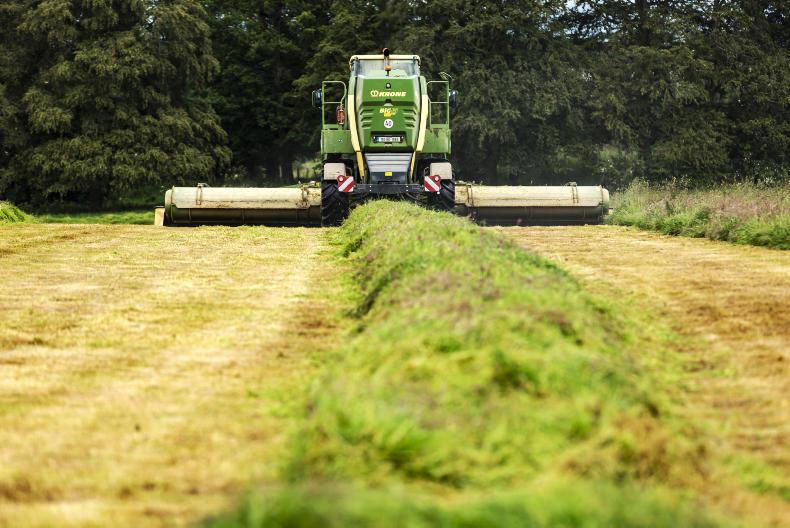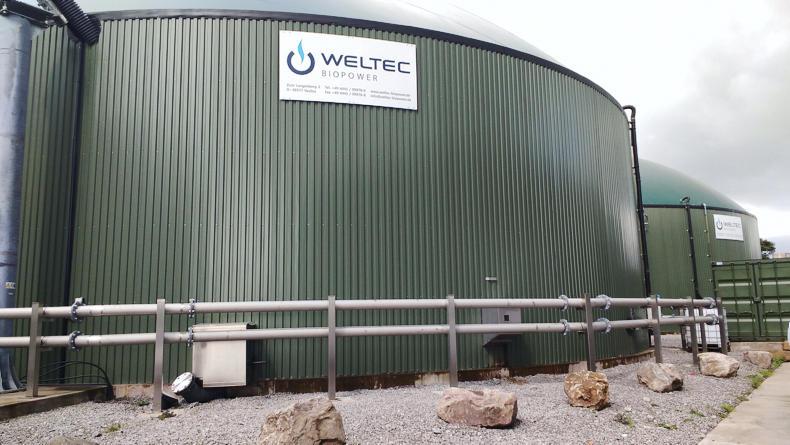There is an appetite among farmers for anaerobic digestion (AD) according to Irish Bioenegy Association (IrBEA) CEO Sean Finan.
However, he notes that there is also a lack of information on the biogas industry from among the farming sector.
Providing information on the biogas was one of the main focuses of the recent IrBEA biogas information workshops held in conjunction with Teagasc during October.
The Irish Farmers Journal caught with Sean recently, where he outlined the potential of the AD sector in Ireland, as well as the supports required to kickstart the industry.
Listen to "Government support scheme for biogas needed to kick start sector - IrBEA" on Spreaker.
EIP project
The workshops were held as part of a small biogas demonstration project.
The project is funded through the European Innovation Partnership and aims to stimulate the deployment of innovative on-farm small-scale biogas production by providing support and a capital contribution to three demonstration projects on selected farms around the country.
Mobilising the Irish biogas industry
Sean explains that they envisage the Irish biogas industry can develop in two ways.
First is the small-scale, farm-based AD plants, where the energy produced from the plant is largely consumed on the farm.

Each 1.25MW slurry/grass biogas plant would require feedstock supplied by farmers equivalent to 240 hectares of grassland per plant per year.
Second is the development of larger-scale AD plants producing biomethane for direct grid injection and which will require Government support.
A recent policy document published by IrBEA and Cré advocated for the introduction of a biomethane support scheme on a phased basis over the short to medium term.
The initial phase would support 65MW of biomethane in 2020. This biomethane would be produced in 25 centralised and strategically located medium- to large-scale biogas plants spread across the country in proximity to the gas grid.
Feedstock would vary, but primarily focus on agricultural products and residues supplied by farmers and wastes from agriculture industry and catering or food production facilities also incorporated in larger-sized plants.
This document outlines how the biogas industry would be developed on a phased basis over a two- to 10-year period, through this support scheme.
Subsequent phases of the scheme would incentivise more biomethane up to a production capacity of 1.6TWh equivalent to 200MW of biomethane production in the medium term. This equates to 1.5% of Ireland's overall gas consumption.
Support
The document proposes that the operator of the plants will be paid the market price for natural gas, currently around 3c/kwh.
In addition, a Government support payment will be necessary to bridge the gap between the market price for natural gas and the cost of production of biogas.
This support will vary from 6c/kwh to 9c/kwh dependant on the scale - see Table 1.
Grass feedstock
IrBEA and Cré envisage a co-operative-style model being developed for farmers to supply these AD plants with feedstock.
In the case of grass, a base price of €35/t freshweight was used in the economic analysis and costings.
Each 1.25MW slurry/grass biogas plant would require feedstock supplied by farmers equivalent to 240 hectares of grassland per plant per year.
Read more
Farm grass and slurry central to €40m biogas proposal
First farm biogas flows to national grid
There is an appetite among farmers for anaerobic digestion (AD) according to Irish Bioenegy Association (IrBEA) CEO Sean Finan.
However, he notes that there is also a lack of information on the biogas industry from among the farming sector.
Providing information on the biogas was one of the main focuses of the recent IrBEA biogas information workshops held in conjunction with Teagasc during October.
The Irish Farmers Journal caught with Sean recently, where he outlined the potential of the AD sector in Ireland, as well as the supports required to kickstart the industry.
Listen to "Government support scheme for biogas needed to kick start sector - IrBEA" on Spreaker.
EIP project
The workshops were held as part of a small biogas demonstration project.
The project is funded through the European Innovation Partnership and aims to stimulate the deployment of innovative on-farm small-scale biogas production by providing support and a capital contribution to three demonstration projects on selected farms around the country.
Mobilising the Irish biogas industry
Sean explains that they envisage the Irish biogas industry can develop in two ways.
First is the small-scale, farm-based AD plants, where the energy produced from the plant is largely consumed on the farm.

Each 1.25MW slurry/grass biogas plant would require feedstock supplied by farmers equivalent to 240 hectares of grassland per plant per year.
Second is the development of larger-scale AD plants producing biomethane for direct grid injection and which will require Government support.
A recent policy document published by IrBEA and Cré advocated for the introduction of a biomethane support scheme on a phased basis over the short to medium term.
The initial phase would support 65MW of biomethane in 2020. This biomethane would be produced in 25 centralised and strategically located medium- to large-scale biogas plants spread across the country in proximity to the gas grid.
Feedstock would vary, but primarily focus on agricultural products and residues supplied by farmers and wastes from agriculture industry and catering or food production facilities also incorporated in larger-sized plants.
This document outlines how the biogas industry would be developed on a phased basis over a two- to 10-year period, through this support scheme.
Subsequent phases of the scheme would incentivise more biomethane up to a production capacity of 1.6TWh equivalent to 200MW of biomethane production in the medium term. This equates to 1.5% of Ireland's overall gas consumption.
Support
The document proposes that the operator of the plants will be paid the market price for natural gas, currently around 3c/kwh.
In addition, a Government support payment will be necessary to bridge the gap between the market price for natural gas and the cost of production of biogas.
This support will vary from 6c/kwh to 9c/kwh dependant on the scale - see Table 1.
Grass feedstock
IrBEA and Cré envisage a co-operative-style model being developed for farmers to supply these AD plants with feedstock.
In the case of grass, a base price of €35/t freshweight was used in the economic analysis and costings.
Each 1.25MW slurry/grass biogas plant would require feedstock supplied by farmers equivalent to 240 hectares of grassland per plant per year.
Read more
Farm grass and slurry central to €40m biogas proposal
First farm biogas flows to national grid







 This is a subscriber-only article
This is a subscriber-only article










SHARING OPTIONS: